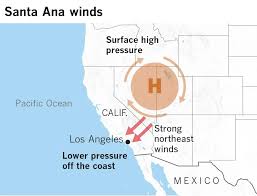Santa Ana Wind:

Experts suggest that Santa Ana winds and climate change are fueling wildfires in Malibu coastal town of Malibu, California.
- Santa Ana Wind is named after Southern California’s Santa Ana Canyon.
- Santa Ana winds are dry and warm (often hot) winds in the Southern California area that blow in from the desert — which includes the Great Basin of the western United States.
- Santa Ana winds blow when high pressure builds over the Great Basin — the area between the Rocky Mountains and Sierra Nevada (a mountain range in the Western United States) — and the pressure is low over California’s coast.
- The difference in pressure triggers the movement of powerful winds from the Basin’s inland deserts, east and north of Southern California, over the mountains toward the Pacific Ocean.
- As the wind comes down the mountains, it compresses and heats up.
- The wind’s humidity also drops, sometimes to less than 20% or even less than 10%. The extremely low moisture turns vegetation dry, making it ready to burn.
- Winter weather patterns allow high pressure to build near the surface of the Great Basin, which then interacts with low-pressure air over the Pacific.
- Santa Ana winds usually occur from October to January.




